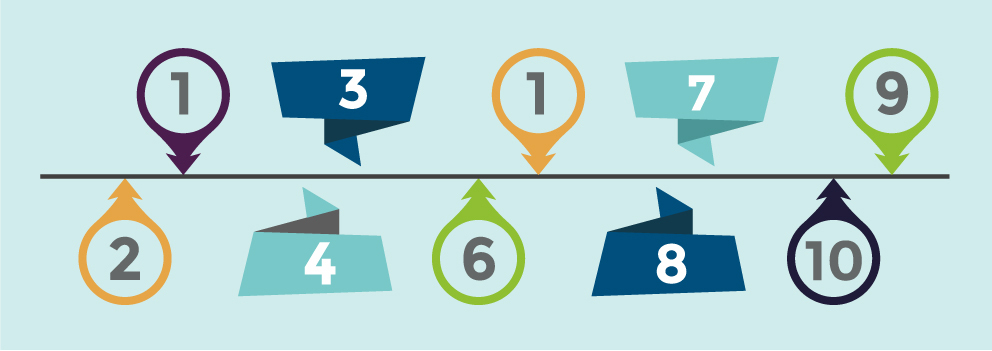CV Tips for landing that perfect job in Devon
CV Tips for landing that perfect job in Devon
We know how imperative it is to have the ideal CV, it is, after all, a potential employer's first introduction to you but how do you set about writing it? What information should you include and what should you leave out? We at AllDevonJobs want to aid you in maximising your possibility of getting that desire so here are hints for making the right first impression.
The Basics
We are all aware it's obvious but a Curriculum Vitae (CV) should on all occasions be typed to give it the greatest ease of read possible. It should also be well presented. Think about how it appears on the page. There should be apparent headings and breaks between sections. A prospective employer will is likely to look through loads of CVs for a job so they should be able to see the important information straightaway before short listing it for a additional thorough read through. A shoddily laid out CV which is complicated to read will probably end up in the rubbish.
Personal Statement
The majority employers would like a CV to begin with a personal statement as it permits them to see immediately what you are about. What should this contain?
- Who are you and what have you been doing work wise? What have you enjoyed about previous jobs?
- What do you want to do? List your Goals?
- How are you going to go about achieving these goals?
- What are your key skills? What can you bring to a prospective employer?
Ensure you give these questions real thought before you come up with an answer as they should be expected to be questioned at interview. Here's an example of the type of thing might say:
' I am bright, a conscientious worker and serious about any challenges I come up against. My employmentto date has all been very customerfacing and I find this to be very enjoyable. I have spent the last four years in a sales environment and I enjoy the contact with different sorts of people this brings. I feel I am intelligent and would like the chance to explore. During my time at Bob Burns Estate Agents really enjoyed learning as much as possible about the procedural and legal aspects of the conveyancing process and feel that I learnt quickly. I am really keen to take on a challenging role with opportunities to advance and train where possible. I am also extremely IT literate and thoroughly enjoy using computers as part of my working life.'
Education
The next section should be your education if it is particularly relevant to the job for which you are applying. For example, if you have a degree in Finance and you are applying for a finance position then it is useful to state this first. However, if you feel your education is not especially relevant and you are applying on the importance of your experience then it is worth possibly putting your work history first.
Your education should be put in reverse order with the most recent education received at the top. It is not necessary to go into huge detail here, simply state where you studied and what grades you achieved. It is not essential to put the dates of study if you do not want to as, under the Age Discrimination Law, you are not obliged to make any reference to your age and including dates from which your age may be obvious. Do not forget to include information of any extra certificates you might have received which may be relevant to the position.
Work History
Like education, it must be laid out in reverse order, the most recent or current employment at the beginning. You should state the name of the organisation and the period of time you were employed (this need not be dates but you should state for how long you were employed there). It is also important to indicate where the employer was based, e.g. Devon. You should also clearly indicate what your job title was. Underneath explain briefly what your job role was and your main tasks. This should aid a perspective employer determine whether your experience makes you suitable for their position. Try to be succinct and keep it to only relevant information.
It is not a good idea to put your salary for each employment undertaken on your CV as this can make an employer to make assumptions about your suitability for a role and make negotiating your salary, where applicable, more difficult. Similarly the same could also be said for putting your salary expectation on your CV.
Other Information
It is usual for people to put a little bit of personal information, such as hobbies, on their CV. You should keep this to a minimum. You should, however, state whether you have a driving licence and whether you own your own car etc.
It is not always the case that employers like to see photos on a CV. For most roles it is unnecessary to include a photo but if you wish to it should be passport photo sized and professional in appearance.
Spelling and Punctuation
It is vital that you ensure all spelling and punctuation are perfect. Literacy is often highly valued to employers so use the 'Spell Check' function on your computer.
Second Opinion
Ask someone to read through your CV. Ask them to confirm that it looks presentable and easy to read. You should also ask them to check your spelling and grammar.
Covering Letter
When applying for a vacancy try to include a covering letter. This should state why you are applying for this job in particular and a little bit about the experience and/or skills you have which would be significant to them (avoid repeating too much from the CV itself).
Each Job is Different
Remember that it is not necessarily 'one CV fits all', it is worth spending a few moments checking your CV before each occasion you submit it to ensure it makes the biggest impact for each particular position. You may want to consider changing some information, particularly your personal statement, to suit the job description.
Careers Advice
We work with experts in and around our local area to provide useful information relating to careers advice - we hope you will find these articles to be helpful. You can view our news news archive here

Dealing with Redundancy - Part 5 - Finding a New Job
Once your redundancy is dealt with and any retraining has been undertaken you will probably need to find a new job. This can seem daunting, particularly if you have not had to look for a new
read more
Redundancy - Advice for Employers and Businesses
When we hear the word 'redundancy' it is natural to think of the impact that it will have on the person being made redundant with out regard for the difficulties inflicted upon the employer
read more
Dealing with Redundancy - Part 2 - Financial Advice
Do you know the tax implications of receiving a redundancy package and how to avoid paying unnecessary tax? If you are going to find yourself struggling financially do you know how to lessen
read more
Dealing with Redundancy - Part 1 - Knowing Your Rights
Do you know what redundancy package you are likely to receive? Do you know what the government stipulated minimum package is? As well as detailing the legal and financial aspects we will
read more
Dealing with Redundancy - Part 3 - Psychological Impact
Do you feel like you’ve lost your identity and can’t stop feeling negative? It is not only the practicalities of redundancy that need to be addressed. Redundancy can also have a massive
read more
Top 10 things not to do in a job interview
We've been asking local employers for tips on what to do in an interview – and, of course, what not to do! Here are our top 10 not to do in that all-important job interview.
read more
Dealing with Redundancy - Part 4 - Retraining and Development
Have you thought about a new career or improving upon the skills you currently have? In this article we will offers tips and advice on increasing your 'employability' through courses and
read more
10 Steps to Creating Career Opportunities
It's too easy to start looking in the job section of the paper and applying for everything that has an attractive salary, car or any other perks, before falling into this trap, be really
read moreDevon Employment & Business News
When attending interviews it's always good to be up to date with what's happening in the local business and employment sector - we hope you'll find these selected news articles interesting
Part time Jobs in Devon
It can seem hard to get a job that fits in with your life commitments. We are aware that 9 to 5 from Monday to Friday will not suit everyone. In fact, statistics demonstrate that the number of employees working over 45 hours a week is in decline. It is not unusual for people to need hours which fit around personal factors including childcare. If you’re seeking a part time job in townname what are some common sectors to find flexible hours and how can sitename help you find a part time job in townname? Common Part Time Jobs in Townname Part time jobs in townname are available in all sectors but experience has shown that certain sectors frequently have a greater number of flexible openings than others, particularly when you require a part time job with lesser experience needed. Here are some sectors that we recommend that you might want to look at: Customer Services It is not uncommon for companies to require flexible ..read more
Nursing jobs in Devon
Nursing and care is one of the principle industries in Devon with a number of hospitals and hundreds of care homes and care establishments in this area. All of these facilities need staffing but how can you set about searching ..read more
What not to do in your Devon job interview
As well as preparing for what you should do on a job interview, whether it's a part time job in Devon or that exciting next step on the career ladder, it is just as key that you know ..read more
Top 4 questions asked at job interviews for Devon job seekers
1. Describe your strengths It is almost guaranteed that on most Devon job interviews you will be asked what you think your areas of strength are (and sometimes what you think your weaknesses / ..read more
Interview Tips to help you get that perfect job in Devon
AllDevonJobs is custom made to assist people find jobs in Devon or to find jobs near Devon. With the job market now more competitive than ever before, you need to give ..read more
The Recruitment Process to Fill your Devon Job
How can you find the right Devon job for you?
What is different about looking for jobs today in Devon compared to 10 years ago
Covering Letter hints and tips for when applying for jobs in Devon
Looking for a second job in Devon?
The University of Exeter / Exeter College / South Devon College
Information on local newspapers covering Devon
Example CV for people applying for jobs in Devon

Job Satisfaction
When visiting this website your top priority maybe to get a job, any job, to try and sustain the lifestyle you have become accustomed to or the one that you think you want for yourself,
read more
Keep your drive and personal energy alive
Doing things because we should do, ought to or must do can make life a chore and we can become a victim of our circumstances. Lacking purpose can sap our drive and energy. While you are
read more